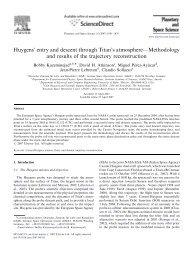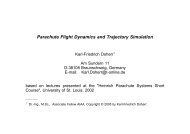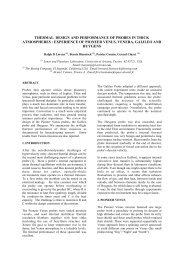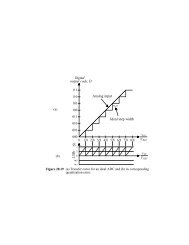Autobiography of a Maquoketa Boy-2.pdf - Microelectronics ...
Autobiography of a Maquoketa Boy-2.pdf - Microelectronics ...
Autobiography of a Maquoketa Boy-2.pdf - Microelectronics ...
Create successful ePaper yourself
Turn your PDF publications into a flip-book with our unique Google optimized e-Paper software.
<strong>Autobiography</strong> <strong>of</strong> a <strong>Maquoketa</strong> <strong>Boy</strong><br />
Richard B. Wells<br />
own heart, or it isn’t a duty and it isn’t an obligation. You have to take it on <strong>of</strong> your own free will or it<br />
isn’t a moral choice. No preacher, no book, no parent, no person can force a moral choice on another<br />
person. Society can make certain actions crimes; society can punish its criminals. But society cannot<br />
dictate what morality is to any single person. If you don’t know in your own heart something is right or<br />
wrong, if you don’t feel the rightness or wrongness in that inner place where God will touch you if you let<br />
Him, nobody else can make it right or wrong for you. Norval was face to face with making the most awful<br />
decision <strong>of</strong> his life. I thought I knew exactly how he was feeling. I had had to make my choice and it had<br />
been terrible and painful and frightening. I wasn’t going to judge his choice. I might agree it was the right<br />
thing, or I might disagree with his choice, but I wasn’t going to pass moral judgment on his choice whatever<br />
it turned out to be. Something else John Stuart Mill had written came to my mind as we talked:<br />
If all mankind minus one were <strong>of</strong> one opinion, and only one person were <strong>of</strong> the contrary opinion,<br />
mankind would be no more justified in silencing that one person than he, if he had the power,<br />
would be justified in silencing mankind.<br />
I could not make Norval’s choice for him, but he had a right to know what his options might be. He<br />
was asking for my advice as a friend, and I knew something he did not. “You could get a draft deferment,<br />
Norval,” I told him. He looked at me with a flicker <strong>of</strong> anger, thinking I was teasing him. “Very funny,” he<br />
shot back. “Nixon canceled all the deferments.”<br />
“All but one,” I said. “ROTC. If you’re in ROTC, you’re deferred and you don’t have an obligation to<br />
go into the army for the first two years. By then the draft will probably be gone.” He looked very<br />
thoughtful after I said this, and some <strong>of</strong> the hopelessness left his eyes.<br />
A few days later I was walking along the main street on campus heading back to the frat house when I<br />
saw a diminutive Army ROTC cadet walking toward me. I didn’t pay any attention to him, but just as we<br />
met up I heard a familiar voice say, “Hi, Rick.”<br />
I stopped in my tracks and stared at him. “Norval?” I couldn’t recognize him at all. His long, shoulderlength<br />
hair was gone, replaced by a neat short crop. The mountain man’s beard was gone; only a trim<br />
little mustache was left. I’d never seen Norval’s face clean-shaven before. In his new uniform he looked<br />
just like one <strong>of</strong> those little British army majors you see in the movies. And he was smiling. The gloom,<br />
desperation and despair were gone. Over the next year when we’d see each other now and then, he’d <strong>of</strong>ten<br />
complain about all the ‘Mickey Mouse’ ROTC put him through, but he stayed in it until the draft ended in<br />
1973. Then he went back to being Norval again. He graduated with distinction in electrical engineering<br />
the same year I did and ended up serving our country by working at China Lake as a civilian.<br />
There are two other guys I want to mention in connection with the draft. I never actually knew their<br />
names. They were in several <strong>of</strong> the same classes I was, and I’d <strong>of</strong>ten see them together on campus. They<br />
must have been close friends because where I’d see one <strong>of</strong> them I’d also see the other. They always sat<br />
next to each other in class and I never heard either <strong>of</strong> them speak very much except to each other. I<br />
thought <strong>of</strong> them as ‘Frick’ and ‘Frack’ just to keep them straight in my own mind. On February 2nd,<br />
Frick’s draft number came up one, Frack’s came up two. They both disappeared from campus on the<br />
same day less than about a week later and I never saw or heard about them again. I assumed they’d fled to<br />
Canada, and I didn’t judge them for that choice either. The draft ended in 1973 without calling up a single<br />
one <strong>of</strong> us born in 1953. It turned out all that worry and heartache had been for nothing.<br />
We didn’t talk about the war inside the frat house, and the house took no active part either against it or<br />
supporting it. We couldn’t. Some <strong>of</strong> the guys were in ROTC and planned on serving our country as<br />
<strong>of</strong>ficers after graduation. Others <strong>of</strong> us, like me, thought it was an immoral war and our country was in the<br />
wrong for being part <strong>of</strong> it. Still others had even more radical leanings, although no one actually went so<br />
far as to be a radical. Nobody among us had started the war, nobody among us could stop the war, nobody<br />
among us would have been anything but elated if the war did stop. Arguing about it among ourselves<br />
would serve no purpose whatsoever because there was no way whatsoever we could all be united under<br />
one opinion except for all <strong>of</strong> us wishing it would end.<br />
145









